2009年高中英语150组常用词语辨析
- 格式:doc
- 大小:111.00 KB
- 文档页数:24
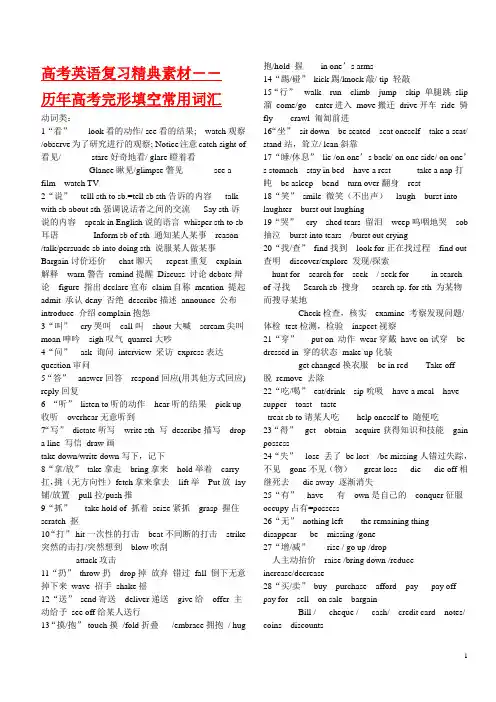
高考英语复习精典素材――历年高考完形填空常用词汇动词类:1“看”look看的动作/ see看的结果; watch观察/observe为了研究进行的观察; Notice注意catch sight of 看见/ stare好奇地看/ glare瞪着看Glance瞅见/glimpse瞥见see a film watch TV2“说”telll sth to sb.=tell sb sth告诉的内容talk with sb about sth强调说话者之间的交流Say sth诉说的内容speak in English说的语言whisper sth to sb 耳语Inform sb of sth 通知某人某事reason /talk/persuade sb into doing sth 说服某人做某事Bargain讨价还价chat聊天repeat重复explain 解释warn警告remind提醒Discuss 讨论debate辩论figure 指出declare宣布claim自称mention 提起admit 承认deny 否绝describe描述announce 公布introduce 介绍complain抱怨3“叫”cry哭叫call叫shout大喊scream尖叫moan呻吟sigh叹气quarrel大吵4“问”ask 询问interview 采访express表达question审问5“答”answer回答respond回应(用其他方式回应) reply回复6 “听”listen to听的动作hear听的结果pick up 收听overhear无意听到7“写”dictate听写write sth 写describe描写drop a line 写信draw画take down/write down写下,记下8“拿/放”take拿走bring拿来hold举着carry 扛,挑(无方向性)fetch拿来拿去lift举Put放lay 铺/放置pull拉/push推9“抓”take hold of 抓着seize紧抓grasp 握住scratch 抠10“打”hit一次性的打击beat不间断的打击strike 突然的击打/突然想到blow吹刮attack攻击11“扔”throw扔drop掉放弃错过fall 倒下无意掉下来wave 招手shake摇12“送”send寄送deliver递送give给offer 主动给予see off给某人送行13“摸/抱”touch摸/fold折叠/embrace拥抱/ hug 抱/hold 握in one’s arms14“踢/碰”kick踢/knock敲/ tip 轻敲15“行”walk run climb jump skip 单腿跳slip 溜come/go enter进入move搬迁drive开车ride 骑fly crawl 匍匐前进16“坐”sit down be seated seat oneself take a seat/ stand站,耸立/ lean斜靠17“睡/休息”lie /on one’s back/ on one side/ on one’s stomach stay in bed have a rest take a nap打盹be asleep bend turn over翻身rest18“笑”smile 微笑(不出声)laugh burst into laughter burst out laughing19“哭”cry shed tears 留泪weep呜咽地哭sob 抽泣burst into tears /burst out crying20“找/查”find找到look for正在找过程find out 查明discover/explore 发现/探索hunt for search for seek / seek for in search of寻找Search sb 搜身search sp. for sth 为某物而搜寻某地Check检查,核实examine 考察发现问题/体检test检测,检验inspect视察21“穿”put on 动作wear穿戴have on试穿be dressed in 穿的状态make-up化装get changed换衣服be in red Take off脱remove 去除22“吃/喝”eat/drink sip吮吸have a meal have supper toast tastetreat sb to请某人吃help oneself to 随便吃23“得”get obtain acquire获得知识和技能gain possess24“失”lose 丢了be lost /be missing人错过失踪,不见gone不见(物)great loss die die off相继死去die away 逐渐消失25“有”have 有own是自己的conquer征服occupy占有=possess26“无”nothing left the remaining thing disappear be missing /gone27“增/减”rise / go up /drop人主动抬价raise /bring down /reduceincrease/decrease28“买/卖”buy purchase afford pay pay off pay for sell on sale bargainBill / cheque / cash/ credit card notes/ coins discounts29“存在/消失”come into being exist appear survive live show turn upDisappear die die out pass away be out of sight30“变化”develop improve become grow go+ bad /wrong/ sour /without(negative adj.)turn + colour change /change into reform31“认识的过程”feel sense guess suppose wonder doubt know /learn realizeUnderstand remember be familiar with recall recite apply to32“成功/失败”make it succeed make progress come true realize one’s dream winLose fail to do failure defeat suffer loss beat turn sth. Into reality33“努力”try /manage make efforts attempt do ones best do as much as one can to do34祝贺congratulations on sb celebrate observe 庆祝get together 聚会35赞美/批评praise think highly of / blame sb for sth/ sb is to blamecriticize /scold sb. for sth. have a low opinion of sb Speak ill of36喜/恶like love be fond of be keen on be crazy about adore be into prefer enjoy in favor of Dislike hate be awful/disgusting ignore turn off37判断think believe consider find feel conclude infer doubt38到达arrive at reach return to get to stay in sp visit leave leave foron one’s way to upon one’s arrival on doing sth 39受伤hurt injured wound cut kill drown bleed get burnt suffer fromsuffer a loss40损坏damage destroy ruin break down be broken crash41修复repair rebuild restore fix recover oneself42支持/反对agree disagree accept receive refuse turn downbe against elect vote for/ against43 做饭cook wash cut chop boil fry steam make mix clean brush cover uncover cooker 44 建议advise suggest recommend urge propose demand persuade 说服45 花费sth/doing sth+cost sb+spend+ in doing sth Sb+afford +n/to do sthIt +take some time/ money/energy +to do sth sb+ pay+$ for sth. at one’s expense46 省/存钱save /save up set aside put away spare no effort/ time47 参加take part in join /join in attend compete in/ for/against48控告accuse sb. of charge sb. With49 救治help /help out save /rescue sb from sth. Treat过程/ cure 结果sb. Of sthAid sb in doing sth / to do sth help sb with sth assist sb in doing sth50敬佩admire respect show respect for/to adore envy /be jealousy in honor of51逃避ran away escape from flee hide52 阻止/禁止prevent / keep/ stop sb. From doing sth forbid doing sth. Ban prohibit53 对付/处理handle / do with / deal with /tackle/overcome sth solve settle54 效仿copy imitate learn from learn54 爆发/发生come about happen to take place break outburst out go off explosion55安装/装备fasten fix set equipbe armed with 用什么武装be equipped with装备有56 追求pursuit ran after seek after chase catch up with赶上keep up with跟上57 想/考虑think of 考虑/+as把什么看成think about 想起considerthink over仔细考虑be concerned 担心be considerate towards sb.58 打算plan / intend / design to do be going to do /be about to do /will do59 似乎/好象seem appear look like as if as though60 开办/关闭open start set up close/close up end close down名词类“1假期vacation holiday spring break ask for leavebe on holiday have two days off2旅游trip journey tour voyage travel tourist passenger go camping/picnicking/hiking3职务人员clerk secretary passer-by friend minister manager waitress guest host hostessAssistant customer adult neighbor relative patient /vet staff crew nurse teacherConductor tailor sailor inventor gardener guard4餐馆/定餐/就餐inn restaurant kitchen menubill order tip fork and knife reserve /book table Taste delicious salad dash vegetables fruit tray napkin5诊所/看病/服药clinic hospital take one’s temperature take medicine/pills have a fever/flu/headache doctor physician surgeon specialist patient6车站/机场airport on board miss the train/bus catch a train meet sb.7身体部位arm head hair brain waist back shoulder pulse wrist8意志will courage patience determination faith effort confidence ambition energy9才能/品质talent gift ability potential intelligent promising smart stupid careful proudStrict honest cold serious easy-going learned knowledgeable10优缺点advantage disadvantage strength weakness11目标aim goal intention purpose belieffaith12方式means method way manner approach13身体素质strong weak pale sick ill be well keep slim/ fit cut weight/put on weight14图表photo picture graph drawing table line/bar graph pie chart draw a sketch 划草图15文章reading translation essay poem papernovel/fiction article magazine newspaper journal 日志diary日记Files form make a list of16课堂class course lecture example reason message notes words phrase scholarship degreeSubject question trouble difficulty grades read comment marks17 学校活动match game activity hold a meeting /debate /speech/ ceremony18建议/观点advice suggestion idea proposal view recommandation19气候/天气climate weather storm windy cloudy rainy snow hot/cold/freezing/heat/warmth20交通by train/bus /boat bike on the train/bus /a bike drive a car ride a bikegive sb. a lift/ride21习惯habit custom get used to regular有规律的(形容词)practice惯例(名词)22感觉sight hearing touch smell sense23情感feeling emotion anger delight sadness sorrow24 财富money possessions wealth belongings fortunes treasure diamond be rich/well-off25 运动比赛on the playground on the track and filed pitch event game match sports player Coach judge jogging weightlifting play volleyball/soccer/ 26衣服clothes, cloth, clothing clothes统指各种衣服,谓语动词永远是复数,cloth指布,为不可数名词clothing 服装的总称,指一件衣服用a piece of, an article of27事件incident, accident incident指小事件, accident指不幸的事故形容词类1人的各种感受乐happy delighted to one’s joy pleased amused 悲sad unhappy painful bitter平静calm quiet silent/still peaceful烦bother bored be fed up with震惊surprised astonished shocked /amazed怕in fear be frightened /scared /afraid失望desperate disappointed hopeless be depressed 满意be satisfied with /be content to do生气Annoyed angry disgusting burst into rage2 表程度的副词类narrowly/ Nearly/ almost hardly/ hard extremely/ very very/ quiteAccidently/ once in a while occasionaly/ once far / by farFarther/ further better/ worse be well/ good however/ therefore/so/thus….易考的近义词组Run/ manage grow/ plant leave/remainfit/ suit/ matchHit/ beat/strike meet/ satisfy touch /feelplay /performerContain/ hold /seat/ fill lie/sit/locate help/work/ doFall/ sink/ drop matter/ problem /trouble/money/ accountCause/ reason that’s why/ that’s because because/ since,as/ forLast/ continue keep/ stay/ treat/ cure/ operate separate/ divideStand/ bear/tolerate/hold turn/become/gochange/vary/rangeProvide/supply/offer/ give/send高考英语常用词汇辨析Aabout around round 作副词时都含“四处”、“遍地”的意思。
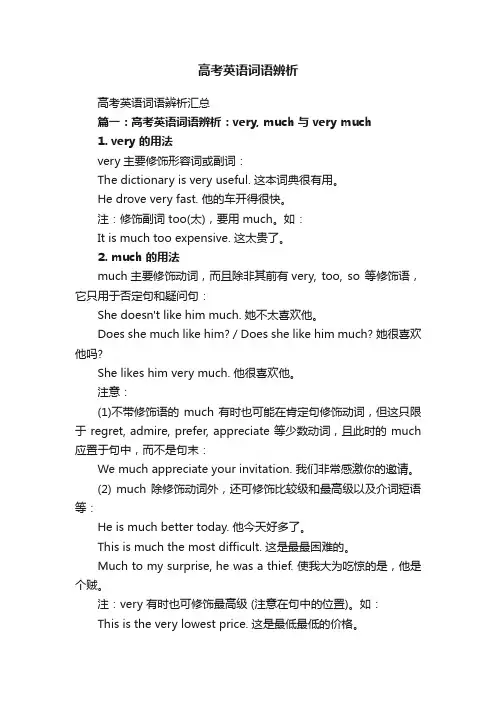
高考英语词语辨析高考英语词语辨析汇总篇一:高考英语词语辨析:very, much 与 very much1. very 的用法very主要修饰形容词或副词:The dictionary is very useful. 这本词典很有用。
He drove very fast. 他的车开得很快。
注:修饰副词 too(太),要用 much。
如:It is much too expensive. 这太贵了。
2. much 的用法much主要修饰动词,而且除非其前有very, too, so 等修饰语,它只用于否定句和疑问句:She doesn't like him much. 她不太喜欢他。
Does she much like him? / Does she like him much? 她很喜欢他吗?She likes him very much. 他很喜欢他。
注意:(1)不带修饰语的much有时也可能在肯定句修饰动词,但这只限于 regret, admire, prefer, appreciate 等少数动词,且此时的 much 应置于句中,而不是句末:We much appreciate your invitation. 我们非常感激你的邀请。
(2) much 除修饰动词外,还可修饰比较级和最高级以及介词短语等:He is much better today. 他今天好多了。
This is much the most difficult. 这是最最困难的。
Much to my surprise, he was a thief. 使我大为吃惊的是,他是个贼。
注:very 有时也可修饰最高级 (注意在句中的位置)。
如:This is the very lowest price. 这是最低最低的价格。
(3) 修饰过去分词,通常用 much,不用 very。
但修饰已经转化成形容词的过去分词,或形容词性质较强的过去分词(如过去分词作定语时),则可用 very。
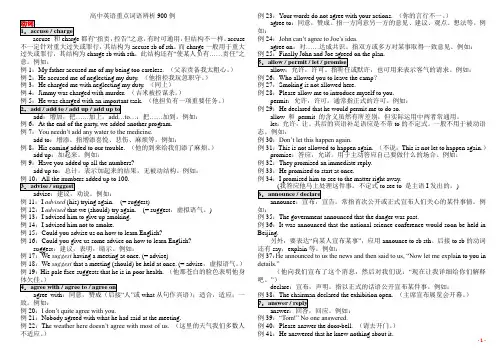
- 1 -高中英语重点词语辨析900例都有“指责,控告”之意,有时可通用,但结构不一样。
accuse 不一定针对重大过失或罪行,其结构为accuse sb of sth 。
而charge 一般用于重大过失或罪行,其结构为charge sb with sth ,此结构还有“使某人负有……责任”之意。
例如:例1:My father accused me of my being too careless. (父亲责备我太粗心。
) 例2:He accused me of neglecting my duty. (他指控我玩忽职守。
) 例3:He charged me with neglecting my duty. (同上)例4:Jimmy was charged with murder. (吉米被控谋杀。
)(他担负有一项重要任务。
) :把……加到。
例如: 例6:At the end of the party, we added another program. 例7:You needn’t add any water to the medicine.add to :增添。
指增添喜悦、悲伤、麻烦等。
例如:例8:His coming added to our trouble. (他的到来给我们添了麻烦。
)add up :加起来。
例如:例9:Have you added up all the numbers?add up to :总计。
表示加起来的结果,无被动结构。
例如:例11:I advised (his) trying again. (= suggest)例12:I advised that we (should) try again. (= suggest ,虚拟语气。
) 例13:I advised him to give up smoking. 例14:I advised him not to smoke.例15:Could you advise us on how to learn English?例16:Could you give us some advice on how to learn English?suggest :建议,表明,暗示。

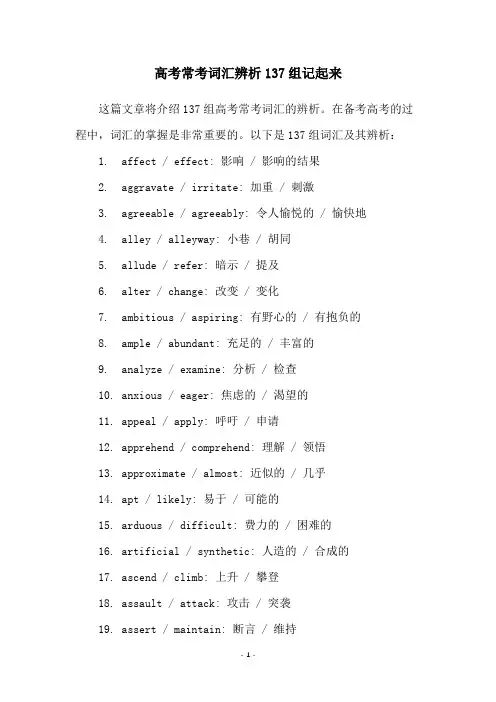
高考常考词汇辨析137组记起来这篇文章将介绍137组高考常考词汇的辨析。
在备考高考的过程中,词汇的掌握是非常重要的。
以下是137组词汇及其辨析:1. affect / effect: 影响 / 影响的结果2. aggravate / irritate: 加重 / 刺激3. agreeable / agreeably: 令人愉悦的 / 愉快地4. alley / alleyway: 小巷 / 胡同5. allude / refer: 暗示 / 提及6. alter / change: 改变 / 变化7. ambitious / aspiring: 有野心的 / 有抱负的8. ample / abundant: 充足的 / 丰富的9. analyze / examine: 分析 / 检查10. anxious / eager: 焦虑的 / 渴望的11. appeal / apply: 呼吁 / 申请12. apprehend / comprehend: 理解 / 领悟13. approximate / almost: 近似的 / 几乎14. apt / likely: 易于 / 可能的15. arduous / difficult: 费力的 / 困难的16. artificial / synthetic: 人造的 / 合成的17. ascend / climb: 上升 / 攀登18. assault / attack: 攻击 / 突袭19. assert / maintain: 断言 / 维持20. assess / evaluate: 评估 / 评价21. assign / appoint: 分配 / 任命22. associate / affiliate: 联想 / 隶属23. assume / presu 假定 / 推测24. assure / ensure: 保证 / 确保25. attach / connect: 附上 / 连接26. attempt / try: 尝试 / 试图27. attitude / approach: 态度 / 方法28. authentic / genuine: 真正的 / 真实的29. awkward / clumsy: 笨拙的 / 不灵活的30. balance / equilibrium: 平衡 / 平衡状态31. ban / forbid: 禁止 / 不准32. barren / desolate: 贫瘠的 / 荒凉的33. base / foundation: 基础 / 基础34. bear / carry: 承受 / 携带35. benefit / advantage: 利益 / 优势36. bias / prejudice: 偏见 / 偏见37. blame / fault: 责备 / 错误38. bond / connection: 债券 / 连接39. boundary / border: 边界 / 边界40. brief / concise: 简洁的 / 简明的41. brilliant / outstanding: 辉煌的 / 杰出的42. broaden / expand: 扩大 / 扩张43. brutal / cruel: 残酷的 / 残忍的44. callous / insensitive: 冷酷的 / 漠不关心的45. capacity / ability: 容量 / 能力46. capture / seize: 捕获 / 抓住47. care / concern: 照顾 / 关注48. cautious / careful: 谨慎的 / 小心的49. cease / stop: 停止 / 停止50. celebrate / commemorate: 庆祝 / 纪念51. certain / sure: 确定的 / 确信的52. challenge / confront: 挑战 / 面对53. characteristic / trait: 特征 / 特点54. charge / accuse: 费用 / 控告55. check / inspect: 检查 / 检查56. cherish / treasure: 珍惜 / 珍视57. choice / option: 选择 / 选择58. cite / quote: 引用 / 引用59. clarify / explain: 澄清 / 解释60. classify / categorize: 分类 / 分类61. clever / intelligent: 聪明的 / 聪明的62. coerce / compel: 强迫 / 强制63. collaborate / cooperate: 合作 / 合作64. collide / crash: 碰撞 / 撞车65. combine / unite: 结合 / 联合66. comfort / console: 安慰 / 安慰67. commend / praise: 赞扬 / 赞美68. commit / devote: 承诺 / 致力于69. common / ordinary: 常见的 / 普通的70. community / society: 社区 / 社会71. compare / contrast: 比较 / 对比72. compel / force: 强迫 / 强迫73. compensate / recompense: 补偿 / 赔偿74. compete / contend: 竞争 / 竞争75. complex / complicated: 复杂的 / 复杂的76. comprehend / understand: 理解 / 理解77. compromise / settlement: 妥协 / 解决78. conceal / hide: 隐藏 / 隐藏79. concede / admit: 让步 / 承认80. conceive / imagine: 构想 / 想象81. concise / brief: 简洁的 / 简短的82. conclude / infer: 结论 / 推论83. condemn / criticize: 谴责 / 批评84. condense / compress: 浓缩 / 压缩85. conduct / behavior: 行为 / 行为86. confidence / trust: 信心 / 信任87. conflict / struggle: 冲突 / 挣扎88. confuse / perplex: 困惑 / 困惑89. congratulate / compliment: 祝贺 / 赞美90. connect / link: 连接 / 连接91. conscience / consciousness: 良心 / 意识92. consecutive / successive: 连续的 / 连续的93. consent / agree: 同意 / 同意94. conserve / preserve: 保护 / 保护95. consider / contemplate: 考虑 / 沉思96. consistent / coherent: 一致的 / 连贯的97. consolidate / strengthen: 巩固 / 加强98. construct / build: 建造 / 建造99. consume / devour: 消耗 / 吞食100. contemplate / consider: 沉思 / 考虑101. content / satisfied: 满意的 / 满足的102. contradict / deny: 矛盾 / 否认103. contrast / difference: 对比 / 差异104. contribute / donate: 贡献 / 捐赠105. convenient / handy: 方便的 / 手边的106. convince / persuade: 说服 / 劝说107. cooperate / collaborate: 合作 / 合作108. cordial / friendly: 热情的 / 友好的109. correlate / correspond: 相关 / 对应110. corrupt / depraved: 腐败的 / 堕落的111. counsel / advice: 忠告 / 建议112. courteous / polite: 礼貌的 / 有礼貌的113. cover / conceal: 覆盖 / 隐藏114. credit / praise: 信用 / 赞扬115. crisis / emergency: 危机 / 紧急情况116. critical / crucial: 批判性的 / 至关重要的 117. crucial / essential: 至关重要的 / 必要的 118. cultivate / nurture: 培养 / 培养119. curious / inquisitive: 好奇的 / 好问的120. current / present: 当前的 / 现在的121. dare / risk: 敢 / 冒险122. dazzle / glitter: 眼花 / 闪烁123. debate / argue: 辩论 / 争论124. deceive / mislead: 欺骗 / 误导125. decline / decrease: 下降 / 减少126. dedication / commitment: 奉献 / 承诺127. defend / protect: 辩护 / 保护128. define / describe: 定义 / 描述129. defy / challenge: 违抗 / 挑战130. delay / postpone: 延迟 / 推迟131. delicate / sensitive: 精致的 / 敏感的132. demand / require: 需求 / 要求133. demonstrate / show: 演示 / 展示134. dense / thick: 密集的 / 厚的135. deny / refuse: 否认 / 拒绝136. depend / rely: 依赖 / 依赖137. describe / depict: 描述 / 描绘以上是137组高考常考词汇的辨析,考生们可以按照自己的复习需要,逐一记忆和练习。
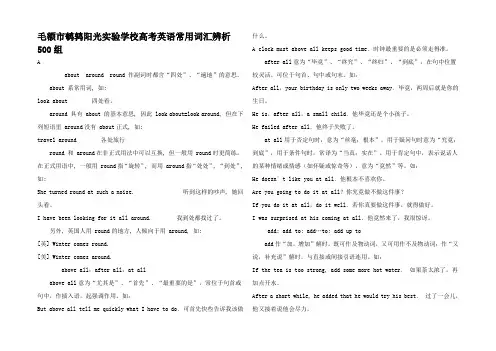
毛额市鹌鹑阳光实验学校高考英语常用词汇辨析500组Aabout around round 作副词时都含“四处”、“遍地”的意思。
about 系常用词, 如:look about 四处看。
around 具有 about 的基本意思, 因此 look about=look around, 但在下列短语里 around没有 about正式, 如:travel around 各处旅行round 和 around在非正式用法中可以互换, 但一般用 round时更简练。
在正式用语中, 一般用 round指“旋转”, 而用 around指“处处”, “到处”, 如:She turned round at such a noise. 听到这样的吵声, 她回头看。
I have been looking for it all around. 我到处都找过了。
另外, 英国人用 round的地方, 人倾向于用 around, 如:[英] Winter comes round.[美] Winter comes around.above all;after all;at allabove all意为“尤其是”、“首先”、“最重要的是”,常位于句首或句中,作插入语,起强调作用。
如:But above all tell me quickly what I have to do.可首先快些告诉我该做什么。
A clock must above all keeps good time.时钟最重要的是必须走得准。
after all意为“毕竟”、“终究”、“终归”、“到底”,在句中位置较灵活。
可位于句首、句中或句末。
如:After all,your birthday is only two weeks away.毕竟,两周后就是你的生日。
He is,after all,a small child.他毕竟还是个小孩子。
He failed after all.他终于失败了。
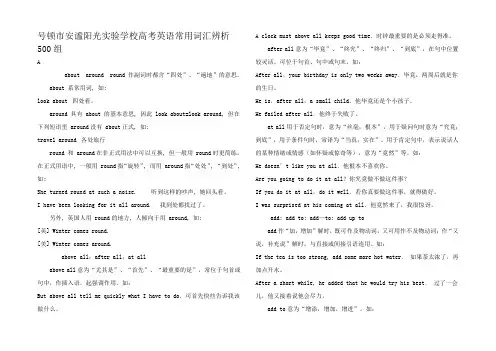
号顿市安谧阳光实验学校高考英语常用词汇辨析500组Aabout around round 作副词时都含“四处”、“遍地”的意思。
about 系常用词, 如:look about 四处看。
around 具有 about 的基本意思, 因此 look about=look around, 但在下列短语里 around没有 about正式, 如:travel around 各处旅行round 和 around在非正式用法中可以互换, 但一般用 round时更简练。
在正式用语中, 一般用 round指“旋转”, 而用 around指“处处”, “到处”, 如:She turned round at such a noise. 听到这样的吵声, 她回头看。
I have been looking for it all around. 我到处都找过了。
另外, 英国人用 round的地方, 人倾向于用 around, 如:[英] Winter comes round.[美] Winter comes around.above all;after all;at allabove all意为“尤其是”、“首先”、“最重要的是”,常位于句首或句中,作插入语,起强调作用。
如:But above all tell me quickly what I have to do.可首先快些告诉我该做什么。
A clock must above all keeps good time.时钟最重要的是必须走得准。
after all意为“毕竟”、“终究”、“终归”、“到底”,在句中位置较灵活。
可位于句首、句中或句末。
如:After all,your birthday is only two weeks away.毕竟,两周后就是你的生日。
He is,after all,a small child.他毕竟还是个小孩子。
He failed after all.他终于失败了。
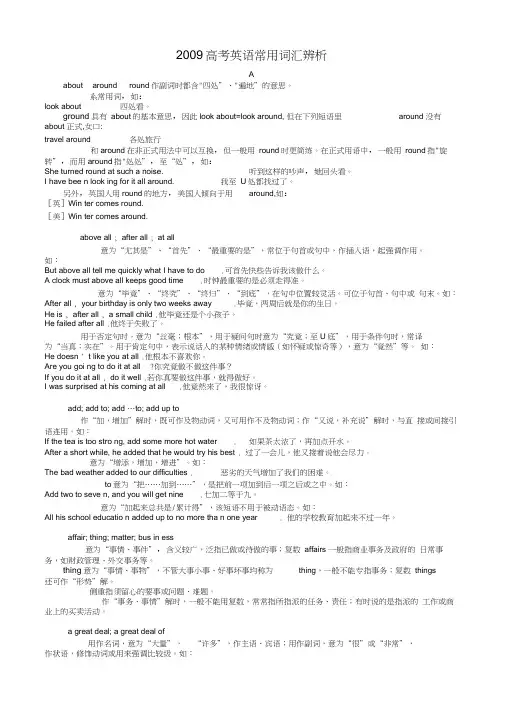
2009高考英语常用词汇辨析Aabout around round作副词时都含"四处”、"遍地”的意思。
系常用词,如:look about 四处看。
ground具有about的基本意思,因此look about=look around, 但在下列短语里around 没有about 正式,女口:travel around 各处旅行和around在非正式用法中可以互换,但一般用round时更简练。
在正式用语中,一般用round指"旋转”,而用around指"处处”,至“处”,如:She turned round at such a noise. 听到这样的吵声,她回头看。
I have bee n look ing for it all around. 我至U处都找过了。
另外,英国人用round的地方,美国人倾向于用around,如:[英]Win ter comes round.[美]Win ter comes around.above all ; after all ; at all意为“尤其是”、“首先”、“最重要的是”,常位于句首或句中,作插入语,起强调作用。
如:But above all tell me quickly what I have to do .可首先快些告诉我该做什么。
A clock must above all keeps good time .时钟最重要的是必须走得准。
意为“毕竟”、“终究”、“终归”、“到底”,在句中位置较灵活。
可位于句首、句中或句末。
如:After all , your birthday is only two weeks away .毕竟,两周后就是你的生日。
He is , after all , a small child .他毕竟还是个小孩子。
He failed after all .他终于失败了。
用于否定句时,意为“丝毫;根本”,用于疑问句时意为“究竟;至U底”,用于条件句时,常译为“当真;实在”。
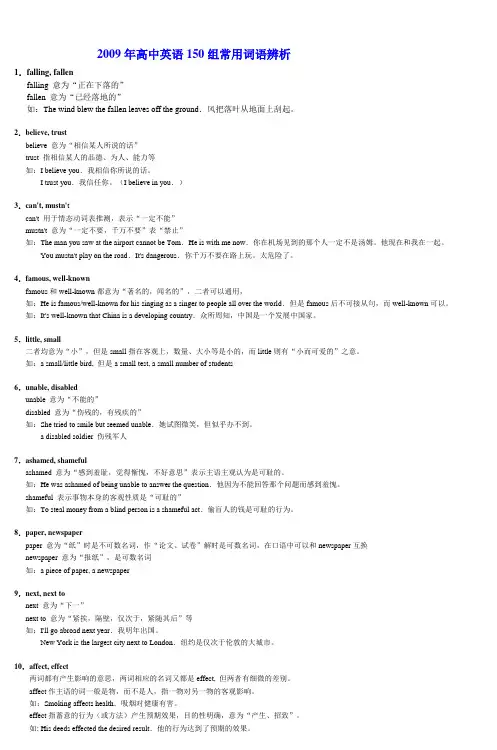
2009年高中英语150组常用词语辨析1.falling, fallenfalling 意为“正在下落的”fallen 意为“已经落地的”如:The wind blew the fallen leaves off the ground.风把落叶从地面上刮起。
2.believe, trustbelieve 意为“相信某人所说的话”trust 指相信某人的品德、为人、能力等如:I believe you.我相信你所说的话。
I trust you.我信任你。
(I believe in you.)3.can't, mustn'tcan't 用于情态动词表推测,表示“一定不能”mustn't 意为“一定不要,千万不要”表“禁止”如:The man you saw at the airport cannot be Tom.He is with me now.你在机场见到的那个人一定不是汤姆。
他现在和我在一起。
You mustn't play on the road.It's dangerous.你千万不要在路上玩。
太危险了。
4.famous, well-knownfamous和well-known都意为“著名的,闻名的”,二者可以通用,如:He is famous/well-known for his singing as a singer to people all over the world.但是famous后不可接从句,而well-known可以。
如:It's well-known that China is a developing country.众所周知,中国是一个发展中国家。
5.little, small二者均意为“小”,但是small指在客观上,数量、大小等是小的,而little则有“小而可爱的”之意。
如:a small/little bird, 但是a small test, a small number of students6.unable, disabledunable 意为“不能的”disabled 意为“伤残的,有残疾的”如:She tried to smile but seemed unable.她试图微笑,但似乎办不到。
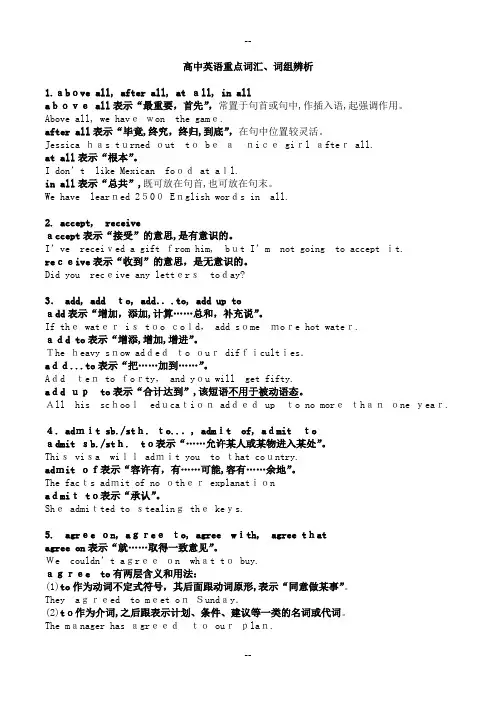
高中英语重点词汇、词组辨析1.above all, after all, at all, in allabove all表示“最重要,首先”,常置于句首或句中,作插入语,起强调作用。
Above all, we havewon the game.after all表示“毕竟,终究,终归,到底”,在句中位置较灵活。
Jessica has turned out to beanice girl after all.at all表示“根本”。
I don’t like Mexican food at all.in all表示“总共”,既可放在句首,也可放在句末。
We have learned 2500 English words in all.2. accept, receiveaccept表示“接受”的意思,是有意识的。
I’ve received a gift from him, but I’m not going to accept it.receive表示“收到”的意思,是无意识的。
Did you receive any letterstoday?3. add, add to, add...to, add up toadd表示“增加,添加,计算……总和,补充说”。
If the water is too cold, add some more hot water.add to表示“增添,增加,增进”。
The heavy snow addedto our difficulties.add...to表示“把……加到……”。
Add ten to forty, and you will get fifty.add upto表示“合计达到”,该短语不用于被动语态。
All his schooleducation added up to no morethanone year.4. admit sb./sth. to..., admit of, admit toadmit sb./sth. to表示“……允许某人或某物进入某处”。
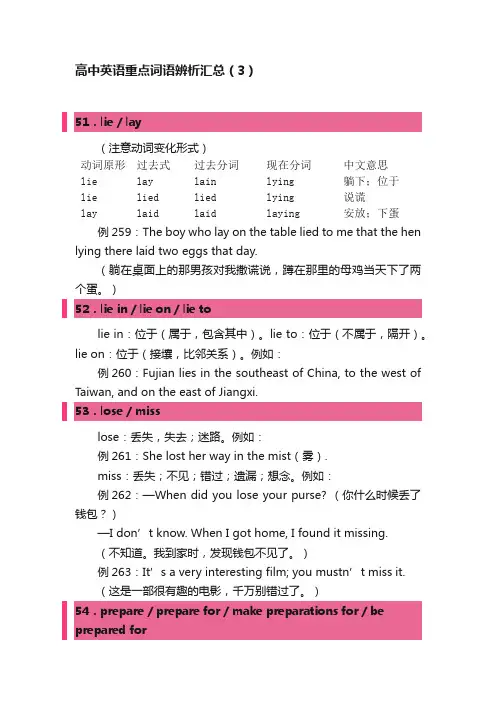
高中英语重点词语辨析汇总(3)51.lie / lay(注意动词变化形式)动词原形过去式过去分词现在分词中文意思lie lay lain lying躺下;位于lie lied lied lying说谎lay laid laid laying安放;下蛋例259:The boy who lay on the table lied to me that the hen lying there laid two eggs that day.(躺在桌面上的那男孩对我撒谎说,蹲在那里的母鸡当天下了两个蛋。
)52.lie in / lie on / lie tolie in:位于(属于,包含其中)。
lie to:位于(不属于,隔开)。
lie on:位于(接壤,比邻关系)。
例如:例260:Fujian lies in the southeast of China, to the west of Taiwan, and on the east of Jiangxi.53.lose / misslose:丢失,失去;迷路。
例如:例261:She lost her way in the mist(雾).miss:丢失;不见;错过;遗漏;想念。
例如:例262:—When did you lose your purse? (你什么时候丢了钱包?)—I don’t know. When I got home, I found it missing.(不知道。
我到家时,发现钱包不见了。
)例263:It’s a very interesting film; you mustn’t miss it.(这是一部很有趣的电影,千万别错过了。
)54.prepare / prepare for / make preparations for / be prepared forprepare:准备。
prepare for / make preparations for (=get ready for):为……而准备。
中学英语重点辨析词语1. damage, harm, hurt, injure,ruindamage:主要指造成价值、效用、完整性方面的损坏,多用于无生命的东西。
The water they had thrown over everything to put out the fire damaged the books.harm:主要用于有生命的东西,间或也用于无生命的事物,常指伤及一个人的健康、权利、事业等。
Though he knows clearly that smoking harms his health, he simply cannot give it up.hurt:尤其指感情或身体遭遇创伤。
My little boy fell off a ladder and hurt himself.You hurt my feelings!injure:尤指在事故中受伤,或损害,损害名誉、自尊等。
Three people were killed and five injured in the crash..ruin: 破坏,使毁坏,这种破坏是使某物价值或用处失去。
My new shoes got ruined in the mud.2.can & be able to 都可以表示能够。
can 有实力做某事,只有现在式和过去式两种形式。
be able to表示要经过一番努力才能做到的事,可用于各种时态,不能用与can连用。
If I concentrate on the work, I'll be able to work out the problem.I'll be able to speak French in another few months.3.grateful to & grateful for 都表示感谢。
grateful to指对……表示感谢,其中的介词to表示对象,宾语通常是人或组织团体。
高考英语高频词语辨析1.after, in这两个介词都可以表示“……(时间)以后”的意思。
after以过去为起点,表示过去一段时间之后,常用于过去时态的句子中。
如:She went after three days.她是三天以后走的。
in 以现在为起点,表将来一段时间以后,常用于将来时态的句子中。
如:She will go in three days.她三天以后要走。
2.how long, how often, how soonhow long指多长时间,主要用来对一段时间(如three days, four weeks 等)提问。
如:How long ago was it? 这是多久前的事了?how often指每隔多久,主要用来对频率副词或状语(如once a week等)提问。
如:—How often does he come here? —Once a month.他(每隔)多久来一次?每月一次?how soon指再过多久,主要用来对表示将来的一段时间(in an hour, in two weeks 等)提问。
如:How soon can you come? 你多快能赶来?3.few, a few, little, a little, several, somefew和little的意思是否定的,表示“很少”或“几乎没有”;而a few和a little的意思是肯定的,表示“有一些,有一点儿”。
few 和a few修饰可数名词;little 和 a little 修饰不可数名词。
several用于修饰可数名词,语意比a few和some更肯定,含有“好几个”的意思。
some可修饰可数名词,也可修饰不可数名词,从数量上说,它有时相当于a few 或 a little,有时指更多一些的数量。
4.the other, anotherthe other 指两个人或事物中的“另一个”,表示特指。
高考常考词语辨析1. clothes, cloth, clothingclothes统指各种衣服,谓语动词永远是复数,cloth指布,为不可数名词clothing 服装的总称,指一件衣服用a piece of, an article of2. incident, accident,eventincident指小事件, accident指不幸的事故He was killed in the accident. event指大的事件3. amount, numberamount后接不可数名词,a large amount of ;an amount ofnumber, a great deal of 后接可数名词a number of students{复数}4. family, house, homehome 家,包括住处和家人,house房子,住宅,family家庭成员.My family is a happy one5. sound, voice, noisesound自然界各种各样的声音,voice人的嗓音,noise噪音I hate the loud noise outside.6. population, peoplepopulation人口人数,people具体的人,民族China has a large population7. weather, climateweather一天内具体的天气状况,不可数名词climate长期的气候状况The climate here is not good for you.8. road, street, path, wayroad具体的公路、马路,street街道,path小路、小径,way道路,途径take this road; in the street,show me the way to the museum.9. course, subjectcourse课程(可包括多门科目),subject科目(具体的学科)a summer course10. custom, habitcustom传统风俗习俗也可指生活习惯后接to dohabit生活习惯,习惯成自然,后接of doing.I’ve got the habit of drinking a lot.11. cause, reasoncause 指造成某一事实或现象的直接原因,后接of sth./doing sth,reason用来解释某种现象或结果的理由,后接for sth./doing sth. the reason for being late 12. exercise, exercises, practiceexercise运动,锻炼(不可数),exercises练习(可数),practice(反复做的)练习+doingPractice makes perfect 固定记忆morning exercises13. class, lesson作‖课‖解时,两者可以替换.指课文用lesson. 指班级或全体学生用class. lesson 6; class 6。
常用高中英语词语辨析105组1.elder 与elderly两者都为“年老的”,但有细微的差别。
elderly 指中年与暮年之间的年龄,表示人已过中年,因此,这词常用来代替 old。
如:anelderly gentleman. 一位年长的绅士。
elder 指年龄稍长者,适用于家庭的兄弟姐妹之间。
如: Tom is the elder of the two. 汤姆是两个孩子中较大的一个。
2.precious 和 expensiveexpensive 表示“昂贵的”。
如:The drink was cheap , but the food was veryexpensive . 饮料很便宜,但食物很贵。
precious 表示“珍贵的,宝贵的”。
如:The children are precious to me . 孩子们对我来说很重要。
3.regret to do 和 regret doingregret doing 表示“做了某事而感到遗憾或后悔”,v-ing 动作发生在regret 之前。
如:Iregretted missing the train. 我为没有赶上火车而感到很懊恼。
regret to do 指“当时或现在遗憾地做什么”。
如:I regret to tell you that we can'tstay here any longer. 我遗憾地告诉你,我们不能在这儿多呆了。
4.day by day 和 day after day两词组意思很近,但有区别:day by day 只用作状语,表示“一天天地”,有逐渐转变的意思。
如:Day by day she seems to grow alittle taller.她似乎一天天地长高了。
day after day 可作主语,宾语等,亦可作状语,表示“一天又一天”,强调动作的重复,表示时间的长久。
如: We do the same work day afterday. 每天我们做着同样的事情。
高中英语重点词汇辨析agree with ,agree to ,agree on 用法探究。
[观察分析]1.They agreed on the project at last.最后他们就这项工程达成了共识。
2.I agree with you =I agree with what you said.我同意你的话。
3.We agreed on a price for the car.我们商定了这辆汽车的价格。
4.The climate he re doesn’t agree with me .我不适应这儿的气候。
5.Do you agree to that plan?你同意那个计划吗?6.He has agreed to the arrangement?他已经同意了那个安排。
7.Do you agree with what I have just said ?你同意我刚刚说的吗?8.Your story agrees with what I have heard.你说的话与我听到的一致。
[思考归纳]1. 三个词组的词意是什么?回答:agree with ,agree to ,agree on 都可以表示 _________;agree to 一般表示个人同意,而agree on 表示 ___________,达成共识。
agree with 还可以表示与(气候或食物等)相__________.2.三个词组在用法上有什么不同?回答:agree with 后面一般跟_____或是某人说的____;后面还可以跟words。
agree to 后面一般跟建议、议案、________、_________等。
agree on 后面一般跟表示具体协议的文件、计划等。
determine 与decide 有何区别?[观察分析]1.We determined to get the work done before May Day.我们决定在五一之前把工作做完。
2009年高中英语150组常用词语辨析1.falling, fallenfalling 意为“正在下落的”fallen 意为“已经落地的”如:The wind blew the fallen leaves off the ground.风把落叶从地面上刮起。
2.believe, trustbelieve 意为“相信某人所说的话”trust 指相信某人的品德、为人、能力等如:I believe you.我相信你所说的话。
I trust you.我信任你。
(I believe in you.)3.can't, mustn'tcan't 用于情态动词表推测,表示“一定不能”mustn't 意为“一定不要,千万不要”表“禁止”如:The man you saw at the airport cannot be Tom.He is with me now.你在机场见到的那个人一定不是汤姆。
他现在和我在一起。
You mustn't play on the road.It's dangerous.你千万不要在路上玩。
太危险了。
4.famous, well-knownfamous和well-known都意为“著名的,闻名的”,二者可以通用,如:He is famous/well-known for his singing as a singer to people all over the world.但是famous后不可接从句,而well-known可以。
如:It's well-known that China is a developing country.众所周知,中国是一个发展中国家。
5.little, small二者均意为“小”,但是small指在客观上,数量、大小等是小的,而little则有“小而可爱的”之意。
如:a small/little bird, 但是a small test, a small number of students6.unable, disabledunable 意为“不能的”disabled 意为“伤残的,有残疾的”如:She tried to smile but seemed unable.她试图微笑,但似乎办不到。
a disabled soldier 伤残军人7.ashamed, shamefulashamed 意为“感到羞耻,觉得惭愧,不好意思”表示主语主观认为是可耻的。
如:He was ashamed of being unable to answer the question.他因为不能回答那个问题而感到羞愧。
shameful 表示事物本身的客观性质是“可耻的”如:To steal money from a blind person is a shameful act.偷盲人的钱是可耻的行为。
8.paper, newspaperpaper 意为“纸”时是不可数名词,作“论文、试卷”解时是可数名词,在口语中可以和newspaper互换newspaper 意为“报纸”,是可数名词如:a piece of paper, a newspaper9.next, next tonext 意为“下一”next to 意为“紧挨,隔壁,仅次于,紧随其后”等如:I'll go abroad next year.我明年出国。
New York is the largest city next to London.纽约是仅次于伦敦的大城市。
10.affect, effect两词都有产生影响的意思,两词相应的名词又都是effect, 但两者有细微的差别。
affect作主语的词一般是物,而不是人,指一物对另一物的客观影响。
如:Smoking affects health.吸烟对健康有害。
effect指蓄意的行为(或方法)产生预期效果,目的性明确,意为“产生、招致”。
如: His deeds effected the desired result.他的行为达到了预期的效果。
11.allow, permit二者均意为“允许”,后接sb.to do, doing,二者常通用。
但是permit不能和副词连用,而allow可以。
并且客观条件许可用permit.如:He wouldn't allow me in.他不愿意让我进去。
Weather permitting, we'll go skating.如果天气允许的话,我们就去滑冰。
12.alone, lone, lonelyalone=by oneself, without others 可作形容词,副词,意为“独自一人”,可作表语和宾补。
如:I happened to be alone at home.我恰好一个人在家。
lone 形容词,意为“孤独的,孤零零的一个”,做定语。
如:In that cloudy sky only one lone star could be seen.在那样的阴天里,只能看到一颗孤零零的星星。
lonely 形容词,意为“孤独的,寂寞的”表示主观上渴望有伴。
若指地方,则有“人迹罕至的,荒凉的,偏僻的”之意,可作定语或表语。
如:He was alone, but he didn't feel lonely.他独自一人,但并不觉得寂寞。
13.although, though二者均意为“虽然”,大部分情况下可通用,但是though可用作副词,放在句尾,although不可这样用。
如:Although/Though he is poor, he is generous.他虽然穷,但很慷慨。
=He is poor.He is generous, though.14.always, often, usuallyalways=at all times 意为“总是”,含“毫无例外”之意。
如:He always stays at home in the evening.他晚上总是呆在家里。
often 指“经常性”的动作如:We often watch TV in the evening.我们晚上常常看电视。
usually也可指“经常”的动作,但侧重从已形成“习惯”的角度来说明动作。
如:We usually do some washing at the weekend.我们通常在周末洗衣服。
15.cap, hat二者均意为“帽,帽子”,cap通常指无沿的帽,只前方有遮沿,如便帽,军帽。
hat通常指周围有边的帽,如礼帽,草帽。
16.neither, none二者均意为“都不”,但是neither表两者都不,而none强调三者或三者以上都不。
如:None of the three boys stayed there.Neither of the two boys stayed there.17.can, may二者均意为“许可,可能”,can可用于Can I…? Can you…? 而may只能用于May I…?18.clever, bright, wiseclever 主要指“聪明,伶俐,机敏,熟练”等如:He is clever at making excuses.他善找借口。
bright 多用于指小孩的“聪明,伶俐”,也指好的建议或想法。
如:He was a bright kid.他是一个聪明的孩子。
wise 指“英明,明智,有远见”,常用于修饰伟人的远见卓识,朋友的聪颖明智如:It was wise of you to keep your mouth shut.你保持沉默是明智的。
19.condition, situationcondition 意为“条件,状况,情况”,常侧重于一定原因或条件造成的状态,如人的健康状况,物的完好程度、设备的可用性等。
如:The old man is in a dying condition.老人处于垂死的状态中。
situation 指某一时间由各种情况造成的“处境,形势”。
如:The present situation calls for entirely new measures.目前的形势要求采取全新的措施。
20.dangerous, in dangerdangerous 意为“危险的”是形容词,指句子的主语对别人有危害。
如:He is a dangerous man.他是一个危险人物。
in danger 意为“处于危险中”,指句子主语的处境。
如:He is in danger of losing his job.他处于失业的危险中。
21.reach, reach forreach 意为“够得到”,表结果reach for 意为“伸手去够”,表动作如:I reached for the apple on the tree, but I couldn't reach it.我伸手去够树上的苹果,但没够到。
22.dead, dying, deadly三者均为形容词,dead意为“死了”,表示状态;dying意为“要死了”;deadly意为“致命的”。
如:a dead dog 一条死狗 a dying dog 一条“濒临死亡”的狗It was a deadly shock to him.这对他来说是致命的打击。
23.decide, determinedecide 指经过考虑或讨论研究作出决定,后接不定式、介词on/upon+(动)名词或从句。
如:It has been decided that museum shall not be open on Saturday.经决定博物馆星期六不开放。
determine 意为“决心,坚决”,后接不定式,侧重于表示决心已下,任何力量都动摇不了,还可接on/upon+动名词。
如:I determined to give him a chance.我决定给他一次机会。
24.demand, request, requiredemand 主语是人时,表示坚决要求,坚持要做某事;主语是物时,指迫切需要。
如:The workers are demanding better pay.工人们要求提高工资。
request 意为“恳求,请求”,指通过正式手续提出的要求,口气和缓,态度礼貌。
如:You're kindly requested to fasten your seatbelts.请各位系好安全带。
require 表示按照法规、权利提出的要求或命令,指客观需要,含“缺此不可”之意。
如:I've done all that is required by the contract.我履行了合同所要求的每一件事。